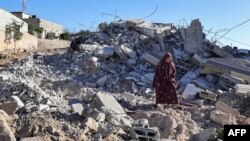Israeli forces carried out attacks Wednesday in the central and southern Gaza Strip as Palestinian civilians sought new areas of shelter after the latest Israeli evacuation order.
The Israeli military said it targeted Hamas fighters with airstrikes in the southern city of Rafah, while ground operations took place in Gaza City's Shujaiya district in northern Gaza.
The United Nations expressed deep concern Tuesday over the Israeli evacuation order for a large swath of the southern Gaza Strip, which the U.N. said affects tens of thousands of civilians.
"Yesterday's order for evacuation of 117 square kilometers in Khan Younis and Rafah governorates applies to about a third of the Gaza Strip – making it the largest such order since October, when residents were ordered to evacuate northern Gaza," Stephane Dujarric, spokesperson for U.N. Secretary-General Antonio Guterres, told reporters.
The U.N. agency that assists Palestinian refugees, UNRWA, estimates that nearly 250,000 people may have resided in the areas under the order at the time it was issued.
Dujarric said people in those areas are left with the "impossible choice" of having to relocate again, to areas that have barely any spaces or services, or staying where they know fighting will take place.
He said the new evacuation order covers an area with more than 90 schools, most of which are housing the displaced, as well as four medical points.
Israeli forces carried out attacks in the southern Gaza Strip on Tuesday, with Palestinian health officials saying at least eight people were killed in Khan Younis.
Israel has repeatedly told Palestinians to leave certain parts of Gaza, usually ahead of military offensives, in a move Israel says is meant to protect civilians from the war. The evacuations, along with the fighting, have meant people have had to flee multiple times in search of safety.
A resident who lives in the targeted evacuation zone, Ahmad Najjar, told Agence France-Presse, "Fear and extreme anxiety have gripped people after the evacuation order." He observed that there has been "a large displacement of residents."
Aid flows
In New York, Sigrid Kaag, the U.N. senior humanitarian and reconstruction coordinator for Gaza, told a meeting of the U.N. Security Council that since Israel began its military operation in Rafah in early May, the volume of aid entering and being distributed across Gaza "has dropped significantly."
"Military activity and the lack of safe routes inside Gaza continue to severely impact humanitarian operations," she said. "A near-total breakdown of civil order has further led to an environment of lawlessness and criminality."
Kaag said the United Nations has asked Israel to find solutions to allow for the safe delivery of aid. Israel disputes that it is not fulfilling its commitments and says it is allowing aid to flow into Gaza from several crossing points.
"Although intentions and commitments may be convincing, the only credible measure of change and progress are the improvements in the lives and well-being of Palestinian civilians in Gaza," she said.
Kaag has also been tasked by the Security Council with establishing a mechanism to monitor and verify the humanitarian nature of all aid entering Gaza to facilitate its speedy distribution. She said it is now operational.
"The mechanism is now capturing humanitarian aid shipments from Jordan, Cyprus, Israel, and the West Bank into Gaza, ensuring greater volume at certain times, transparency and prioritization," she said, adding the mechanism would be active for relief supplies coming from Egypt by mid-July.
Kaag said options are also being discussed on the feasibility and longer-term planning of the Cyprus Maritime Corridor. Relief supplies have been inspected in Cyprus and sent by ship to Gaza since mid-May, but the U.S.-constructed pier that receives them has been plagued with problems and is currently not functional.
A group of former U.S. officials who resigned their posts in response to U.S. positions on the Gaza war said in a joint letter Tuesday that the Biden administration’s policy “is a failure and a threat to U.S. national security.”
"America's diplomatic cover for, and continuous flow of arms to, Israel has ensured our undeniable complicity in the killings and forced starvation of a besieged Palestinian population in Gaza," the former officials said in the statement.
The statement called for the United States to use “all necessary and available leverage to bring the conflict to an immediate close and to achieve the release of all hostages.” The former officials also urged the United States to fund an immediate expansion of humanitarian aid for Gaza.
With international concerns about the possibility of the conflict in Gaza spreading with an Israeli offensive targeting Hezbollah militants inside Lebanon, the deputy head of Hezbollah told the Associated Press Tuesday that a cease-fire in Gaza would bring a halt to the months of fighting along the Israel-Lebanon border.
“If there is a cease-fire in Gaza, we will stop without any discussion,” Hezbollah’s deputy leader, Sheikh Naim Kassem, said.
Kassem said Hezbollah has been battling Israel as a “support front” for Hamas, which like Hezbollah is backed by Iran.
Israel's war against Hamas in Gaza erupted when Hamas-led militants stormed into southern Israel on October 7, killing about 1,200 people and seizing more than 250 hostages, mostly civilians, according to Israeli authorities.
Israel's retaliatory offensive has killed nearly 38,000 people, according to the Hamas-run health ministry in Gaza, and left the densely built-up coastal enclave in ruins.
VOA U.N. Correspondent Margaret Besheer contributed to this report. Some information for this story came from The Associated Press, Agence France-Presse and Reuters.





Forum